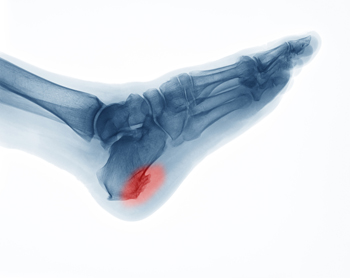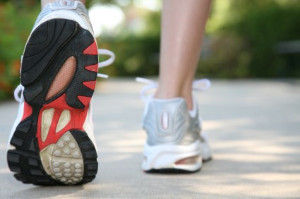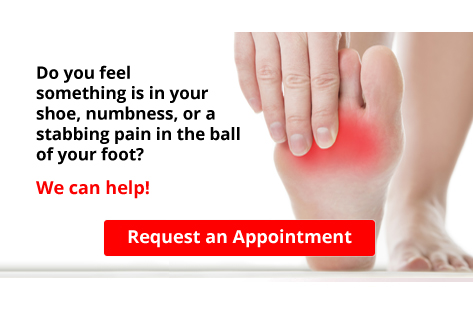November 2019
What is a Heel Spur and How Can it be Treated?
A heel spur may occur when a calcium deposit develops between the arch of the foot and the heel. A common symptom of a heel spur often includes a sharp, intense pain when standing up in the morning. Additional signs you may have a heel spur may consist of an ache, inflammation or swelling in the heel, heat radiating from the affected area, and a noticeable protrusion under the heel. Factors that increase the risk of obtaining a heel spur can include being involved in athletic activities, experiencing trauma to the heel, general aging, and wearing improper footwear. Getting proper rest, and using custom made orthotics may help to alleviate any pain or pressure that exists as a result of a heel spur. If you would like additional information and advice for an effective treatment regime, we recommend that you consult with a podiatrist.
Heel spurs can be incredibly painful and sometimes may make you unable to participate in physical activities. To get medical care for your heel spurs, contact one of our podiatrists from University Foot and Ankle Center, L.L.C. Our doctors will do everything possible to treat your condition.
Heels Spurs
Heel spurs are formed by calcium deposits on the back of the foot where the heel is. This can also be caused by small fragments of bone breaking off one section of the foot, attaching onto the back of the foot. Heel spurs can also be bone growth on the back of the foot and may grow in the direction of the arch of the foot.
Older individuals usually suffer from heel spurs and pain sometimes intensifies with age. One of the main condition's spurs are related to is plantar fasciitis.
Pain
The pain associated with spurs is often because of weight placed on the feet. When someone is walking, their entire weight is concentrated on the feet. Bone spurs then have the tendency to affect other bones and tissues around the foot. As the pain continues, the feet will become tender and sensitive over time.
Treatments
There are many ways to treat heel spurs. If one is suffering from heel spurs in conjunction with pain, there are several methods for healing. Medication, surgery, and herbal care are some options.
If you have any questions feel free to contact one of our offices located in East Brunswick and Monroe Township, NJ. We offer the latest in diagnostic and treatment technology to meet your needs.
Read more about How to Treat Heel SpursExamples of Foot Exercises and Why They Matter
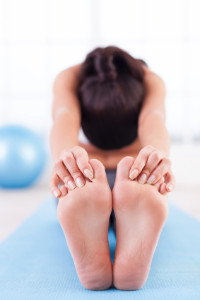 To avoid dealing with issues such as foot and ankle pain, muscle soreness, and to improve the overall health of your feet, it is recommended that you perform foot exercises. When you perform exercises designed for the feet, you help to strengthen the foot muscles, which may provide better support, stability, and protection. One simple exercise you can do is called the three-step “toe raise, point, and curl.” Imagine you’re making little waves with your toes when trying out this exercise. Another exercise is called the “toe splay,” where you practice by spreading all of your toes. Lastly, you can try “toe extensions” which is done by grabbing your toes with your fingers and gently pulling them backwards. If you are concerned with the health of your feet, or would like information about additional stretches, we recommend that you consult with a podiatrist.
To avoid dealing with issues such as foot and ankle pain, muscle soreness, and to improve the overall health of your feet, it is recommended that you perform foot exercises. When you perform exercises designed for the feet, you help to strengthen the foot muscles, which may provide better support, stability, and protection. One simple exercise you can do is called the three-step “toe raise, point, and curl.” Imagine you’re making little waves with your toes when trying out this exercise. Another exercise is called the “toe splay,” where you practice by spreading all of your toes. Lastly, you can try “toe extensions” which is done by grabbing your toes with your fingers and gently pulling them backwards. If you are concerned with the health of your feet, or would like information about additional stretches, we recommend that you consult with a podiatrist.
Exercising your feet regularly with the proper foot wear is a great way to prevent injuries and build strength. If you have any concerns about your feet, contact one of our podiatrists from University Foot and Ankle Center, L.L.C. Our doctors can provide the care you need to keep you pain-free and on your feet.
Exercise for Your Feet
Exercise for your feet can help you gain strength, mobility and flexibility in your feet. They say that strengthening your feet can be just as rewarding as strengthening another part of the body. Your feet are very important, and we often forget about them in our daily tasks. But it is because of our feet that are we able to get going and do what we need to. For those of us fortunate enough to not have any foot problems, it is an important gesture to take care of them to ensure good health in the long run.
Some foot health exercises can include ankle pumps, tip-toeing, toe rises, lifting off the floor doing reps and sets, and flexing the toes. It is best to speak with Our doctors to determine an appropriate regimen for your needs. Everyone’s needs and bodies are different, and the activities required to maintain strength in the feet vary from individual to individual.
Once you get into a routine of doing regular exercise, you may notice a difference in your feet and how strong they may become.
If you have any questions please feel free to contact one of our offices located in East Brunswick and Monroe Township, NJ. We offer the newest diagnostic and treatment technologies for all your foot and ankle needs.
Read more about Exercise for Your FeetExamples of Foot Exercises and Why They Matter
 To avoid dealing with issues such as foot and ankle pain, muscle soreness, and to improve the overall health of your feet, it is recommended that you perform foot exercises. When you perform exercises designed for the feet, you help to strengthen the foot muscles, which may provide better support, stability, and protection. One simple exercise you can do is called the three-step “toe raise, point, and curl.” Imagine you’re making little waves with your toes when trying out this exercise. Another exercise is called the “toe splay,” where you practice by spreading all of your toes. Lastly, you can try “toe extensions” which is done by grabbing your toes with your fingers and gently pulling them backwards. If you are concerned with the health of your feet, or would like information about additional stretches, we recommend that you consult with a podiatrist.
To avoid dealing with issues such as foot and ankle pain, muscle soreness, and to improve the overall health of your feet, it is recommended that you perform foot exercises. When you perform exercises designed for the feet, you help to strengthen the foot muscles, which may provide better support, stability, and protection. One simple exercise you can do is called the three-step “toe raise, point, and curl.” Imagine you’re making little waves with your toes when trying out this exercise. Another exercise is called the “toe splay,” where you practice by spreading all of your toes. Lastly, you can try “toe extensions” which is done by grabbing your toes with your fingers and gently pulling them backwards. If you are concerned with the health of your feet, or would like information about additional stretches, we recommend that you consult with a podiatrist.
Exercising your feet regularly with the proper foot wear is a great way to prevent injuries and build strength. If you have any concerns about your feet, contact Genine Befumo, DPM from University Foot and Ankle Center, L.L.C. Our doctor can provide the care you need to keep you pain-free and on your feet.
Exercise for Your Feet
Exercise for your feet can help you gain strength, mobility and flexibility in your feet. They say that strengthening your feet can be just as rewarding as strengthening another part of the body. Your feet are very important, and we often forget about them in our daily tasks. But it is because of our feet that are we able to get going and do what we need to. For those of us fortunate enough to not have any foot problems, it is an important gesture to take care of them to ensure good health in the long run.
Some foot health exercises can include ankle pumps, tip-toeing, toe rises, lifting off the floor doing reps and sets, and flexing the toes. It is best to speak with Our doctor to determine an appropriate regimen for your needs. Everyone’s needs and bodies are different, and the activities required to maintain strength in the feet vary from individual to individual.
Once you get into a routine of doing regular exercise, you may notice a difference in your feet and how strong they may become.
If you have any questions please feel free to contact our office located in Monroe Township, NJ . We offer the newest diagnostic and treatment technologies for all your foot and ankle needs.
What is a Heel Spur and How Can it be Treated?
A heel spur may occur when a calcium deposit develops between the arch of the foot and the heel. A common symptom of a heel spur often includes a sharp, intense pain when standing up in the morning. Additional signs you may have a heel spur may consist of an ache, inflammation or swelling in the heel, heat radiating from the affected area, and a noticeable protrusion under the heel. Factors that increase the risk of obtaining a heel spur can include being involved in athletic activities, experiencing trauma to the heel, general aging, and wearing improper footwear. Getting proper rest, and using custom made orthotics may help to alleviate any pain or pressure that exists as a result of a heel spur. If you would like additional information and advice for an effective treatment regime, we recommend that you consult with a podiatrist.
Heel spurs can be incredibly painful and sometimes may make you unable to participate in physical activities. To get medical care for your heel spurs, contact Genine Befumo, DPM from University Foot and Ankle Center, L.L.C. Our doctor will do everything possible to treat your condition.
Heels Spurs
Heel spurs are formed by calcium deposits on the back of the foot where the heel is. This can also be caused by small fragments of bone breaking off one section of the foot, attaching onto the back of the foot. Heel spurs can also be bone growth on the back of the foot and may grow in the direction of the arch of the foot.
Older individuals usually suffer from heel spurs and pain sometimes intensifies with age. One of the main condition's spurs are related to is plantar fasciitis.
Pain
The pain associated with spurs is often because of weight placed on the feet. When someone is walking, their entire weight is concentrated on the feet. Bone spurs then have the tendency to affect other bones and tissues around the foot. As the pain continues, the feet will become tender and sensitive over time.
Treatments
There are many ways to treat heel spurs. If one is suffering from heel spurs in conjunction with pain, there are several methods for healing. Medication, surgery, and herbal care are some options.
If you have any questions feel free to contact our office located in Monroe Township, NJ . We offer the latest in diagnostic and treatment technology to meet your needs.
All You Need to Know About Maintaining Healthy Foot Care
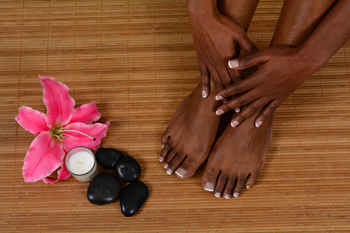 When it comes to foot care, there are a few simple activities you can perform daily to ensure the health of your feet. For starters, it’s important to clean your feet and regularly wash and dry them before putting on shoes and socks. To prevent dryness and possible cracking of the heels or ankles, use a moisturizer daily, preferably one recommended by a podiatrist. Please note, however, to not moisturize between your toes because they will not dry properly. To avoid complications with your toe nails, be sure to cut nails straight across while also avoiding digging into the sides of the nails. Lastly, try to change your shoes everyday. Because the area inside your shoes is dark, wet, and warm, there is a strong chance bacteria and fungus may form if they are not changed regularly. By performing these activities, you may prevent foot odor as well as a variety of conditions such as athlete’s foot and ingrown toenails. If you do experience any issues with your feet, we recommend it is best that you see a podiatrist for a proper diagnosis and advised treatment regime.
When it comes to foot care, there are a few simple activities you can perform daily to ensure the health of your feet. For starters, it’s important to clean your feet and regularly wash and dry them before putting on shoes and socks. To prevent dryness and possible cracking of the heels or ankles, use a moisturizer daily, preferably one recommended by a podiatrist. Please note, however, to not moisturize between your toes because they will not dry properly. To avoid complications with your toe nails, be sure to cut nails straight across while also avoiding digging into the sides of the nails. Lastly, try to change your shoes everyday. Because the area inside your shoes is dark, wet, and warm, there is a strong chance bacteria and fungus may form if they are not changed regularly. By performing these activities, you may prevent foot odor as well as a variety of conditions such as athlete’s foot and ingrown toenails. If you do experience any issues with your feet, we recommend it is best that you see a podiatrist for a proper diagnosis and advised treatment regime.
Everyday foot care is very important to prevent infection and other foot ailments. If you need your feet checked, contact one of our podiatrists from University Foot and Ankle Center, L.L.C. Our doctors can provide the care you need to keep you pain-free and on your feet.
Everyday Foot Care
Often, people take care of their bodies, face and hair more so than they do for their feet. But the feet are a very important aspect of our bodies, and one that we should pay more attention to. Without our feet, we would not be able to perform most daily tasks.
It is best to check your feet regularly to make sure there are no new bruises or cuts that you may not have noticed before. For dry feet, moisturizer can easily be a remedy and can be applied as often as necessary to the affected areas. Wearing shoes that fit well can also help you maintain good foot health, as well as making it easier to walk and do daily activities without the stress or pain of ill-fitting shoes, high heels, or even flip flops. Wearing clean socks with closed shoes is important to ensure that sweat and bacteria do not accumulate within the shoe. Clean socks help to prevent Athlete’s foot, fungi problems, bad odors, and can absorb sweat.
If you have any questions please feel free to contact one of our offices located in East Brunswick and Monroe Township, NJ. We offer the newest diagnostic and treatment technologies for all your foot and ankle needs.
Read more about Every Day Foot CareAll You Need to Know About Maintaining Healthy Foot Care
 When it comes to foot care, there are a few simple activities you can perform daily to ensure the health of your feet. For starters, it’s important to clean your feet and regularly wash and dry them before putting on shoes and socks. To prevent dryness and possible cracking of the heels or ankles, use a moisturizer daily, preferably one recommended by a podiatrist. Please note, however, to not moisturize between your toes because they will not dry properly. To avoid complications with your toe nails, be sure to cut nails straight across while also avoiding digging into the sides of the nails. Lastly, try to change your shoes everyday. Because the area inside your shoes is dark, wet, and warm, there is a strong chance bacteria and fungus may form if they are not changed regularly. By performing these activities, you may prevent foot odor as well as a variety of conditions such as athlete’s foot and ingrown toenails. If you do experience any issues with your feet, we recommend it is best that you see a podiatrist for a proper diagnosis and advised treatment regime.
When it comes to foot care, there are a few simple activities you can perform daily to ensure the health of your feet. For starters, it’s important to clean your feet and regularly wash and dry them before putting on shoes and socks. To prevent dryness and possible cracking of the heels or ankles, use a moisturizer daily, preferably one recommended by a podiatrist. Please note, however, to not moisturize between your toes because they will not dry properly. To avoid complications with your toe nails, be sure to cut nails straight across while also avoiding digging into the sides of the nails. Lastly, try to change your shoes everyday. Because the area inside your shoes is dark, wet, and warm, there is a strong chance bacteria and fungus may form if they are not changed regularly. By performing these activities, you may prevent foot odor as well as a variety of conditions such as athlete’s foot and ingrown toenails. If you do experience any issues with your feet, we recommend it is best that you see a podiatrist for a proper diagnosis and advised treatment regime.
Everyday foot care is very important to prevent infection and other foot ailments. If you need your feet checked, contact Genine Befumo, DPM from University Foot and Ankle Center, L.L.C. Our doctor can provide the care you need to keep you pain-free and on your feet.
Everyday Foot Care
Often, people take care of their bodies, face and hair more so than they do for their feet. But the feet are a very important aspect of our bodies, and one that we should pay more attention to. Without our feet, we would not be able to perform most daily tasks.
It is best to check your feet regularly to make sure there are no new bruises or cuts that you may not have noticed before. For dry feet, moisturizer can easily be a remedy and can be applied as often as necessary to the affected areas. Wearing shoes that fit well can also help you maintain good foot health, as well as making it easier to walk and do daily activities without the stress or pain of ill-fitting shoes, high heels, or even flip flops. Wearing clean socks with closed shoes is important to ensure that sweat and bacteria do not accumulate within the shoe. Clean socks help to prevent Athlete’s foot, fungi problems, bad odors, and can absorb sweat.
If you have any questions please feel free to contact our office located in Monroe Township, NJ . We offer the newest diagnostic and treatment technologies for all your foot and ankle needs.
Read more about Every Day Foot CareCan Practicing Yoga Help to Prevent Running Injuries?
Research has indicated it is beneficial to perform specific stretching techniques that may be helpful in preventing running injuries. It is wise to choose running shoes that fit correctly, assuring the heel and toes feel comfortable. The joints, muscles, and tendons can remain flexible when yoga is routinely practiced, which may help to increase the enjoyment of running. Additionally, many runners practice strength training, this can keep the muscles strong which may add to endurance. Any tension that is present may be alleviated when a massage is performed, helping this to aid the body in feeling relaxed. If you are contemplating the sport of running, it is suggested that you speak to a podiatrist who can advise you on how to prevent running injuries.
Exercising your feet regularly with the proper foot wear is a great way to prevent injuries. If you have any concerns about your feet, contact one of our podiatrists of University Foot and Ankle Center, L.L.C. Our doctors will treat your foot and ankle needs.
How to Prevent Running Injuries
Many common running injuries are caused by overuse and overtraining. When the back of the kneecap starts wearing out and starts causing pain in your knee, this is commonly referred to as runner’s knee. Runner’s knee is a decrease in strength in your quadriceps and can occur if you’re not wearing properly fitted or supporting shoes. To prevent runner’s knee, focusing on hip strengthening is a good idea, as well as strengthening your quads to keep the kneecaps aligned.
What Are Some Causes of Running Injuries?
- One cause of a common running injury is called iliotibial band syndrome.
- Plantar fasciitis is also another common injury.
- Stress fractures can occur from overtraining, lack of calcium, or even your running style.
Best Ways to Prevent Running Injuries
- Wear footwear that fits properly and suits your running needs.
- Running shoes are the only protective gear that runners have to safeguard them from injury.
- Make a training schedule. Adding strengthening exercises as well as regular stretching can help keep you strong and limber and can lessen the possibility of injuries.
- Stretching keeps muscles limber; this will help you gain better flexibility.
If you have any questions please feel free to contact one of our offices located in East Brunswick and Monroe Township, NJ. We offer the newest diagnostic and treatment technologies for all your foot and ankle needs.
Read more about Preventing Running InjuriesCan Practicing Yoga Help to Prevent Running Injuries?
Research has indicated it is beneficial to perform specific stretching techniques that may be helpful in preventing running injuries. It is wise to choose running shoes that fit correctly, assuring the heel and toes feel comfortable. The joints, muscles, and tendons can remain flexible when yoga is routinely practiced, which may help to increase the enjoyment of running. Additionally, many runners practice strength training, this can keep the muscles strong which may add to endurance. Any tension that is present may be alleviated when a massage is performed, helping this to aid the body in feeling relaxed. If you are contemplating the sport of running, it is suggested that you speak to a podiatrist who can advise you on how to prevent running injuries.
Exercising your feet regularly with the proper foot wear is a great way to prevent injuries. If you have any concerns about your feet, contact Genine Befumo, DPM of University Foot and Ankle Center, L.L.C. Our doctor will treat your foot and ankle needs.
How to Prevent Running Injuries
Many common running injuries are caused by overuse and overtraining. When the back of the kneecap starts wearing out and starts causing pain in your knee, this is commonly referred to as runner’s knee. Runner’s knee is a decrease in strength in your quadriceps and can occur if you’re not wearing properly fitted or supporting shoes. To prevent runner’s knee, focusing on hip strengthening is a good idea, as well as strengthening your quads to keep the kneecaps aligned.
What Are Some Causes of Running Injuries?
- One cause of a common running injury is called iliotibial band syndrome.
- Plantar fasciitis is also another common injury.
- Stress fractures can occur from overtraining, lack of calcium, or even your running style.
Best Ways to Prevent Running Injuries
- Wear footwear that fits properly and suits your running needs.
- Running shoes are the only protective gear that runners have to safeguard them from injury.
- Make a training schedule. Adding strengthening exercises as well as regular stretching can help keep you strong and limber and can lessen the possibility of injuries.
- Stretching keeps muscles limber; this will help you gain better flexibility.
If you have any questions please feel free to contact our office located in Monroe Township, NJ . We offer the newest diagnostic and treatment technologies for all your foot and ankle needs.
Read more about Preventing Running InjuriesWhy Live with Pain and Numbness in Your Feet?
Foot Conditions Children May Have
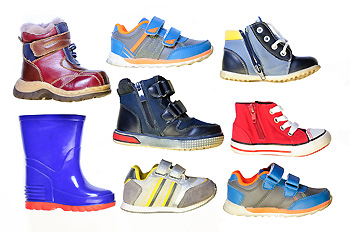 New parents may notice their children are born with flat feet. This is a result of supporting muscles and ligaments that have not fully formed. The arch typically develops as the teenage years approach, and it is generally nothing to be concerned about. Additionally, it is common for children to walk with their toes in or out, and in most cases, will be outgrown. If children frequently participate in sporting activities, you may see blisters on their feet. This can come from wearing shoes and socks that do not fit properly. Children can be susceptible to bunions, especially if it is genetic. A large bump on the side of the big toe may form, and it may cause the second toe to overlap with the one next to it. If you notice anything unusual about your children’s feet, it is advised to consult with a podiatrist who can determine what the best course of treatment is.
New parents may notice their children are born with flat feet. This is a result of supporting muscles and ligaments that have not fully formed. The arch typically develops as the teenage years approach, and it is generally nothing to be concerned about. Additionally, it is common for children to walk with their toes in or out, and in most cases, will be outgrown. If children frequently participate in sporting activities, you may see blisters on their feet. This can come from wearing shoes and socks that do not fit properly. Children can be susceptible to bunions, especially if it is genetic. A large bump on the side of the big toe may form, and it may cause the second toe to overlap with the one next to it. If you notice anything unusual about your children’s feet, it is advised to consult with a podiatrist who can determine what the best course of treatment is.
The health of a child’s feet is vital to their overall well-being. If you have any questions regarding foot health, contact one of our podiatrists of University Foot and Ankle Center, L.L.C. Our doctors can provide the care you need to keep you pain-free and on your feet.
Tips for Keeping Children's Feet Healthy
- Make sure their shoes fit properly
- Look for any signs of in-toeing or out-toeing
- Check to see if they have Clubfoot (condition that affects your child’s foot and ankle, twisting the heel and toes inward) which is one of the most common nonmajor birth defects.
- Lightly cover your baby’s feet (Tight covers may keep your baby from moving their feet freely, and could prevent normal development)
- Allow your toddler to go shoeless (Shoes can be restricting for a young child’s foot)
- Cut toenails straight across to avoid ingrown toenails
- Keep your child’s foot clean and dry
- Cover cuts and scrapes. Wash any scratches with soap and water and cover them with a bandage until they’ve healed.
If you have any questions, please feel free to contact one of our offices located in East Brunswick and Monroe Township, NJ. We offer the newest diagnostic and treatment technologies for all your foot care needs.
Read more about How to Care for Your Child's FeetBlog Archives
- April 2024
- March 2024
- February 2024
- January 2024
- December 2023
- November 2023
- October 2023
- September 2023
- August 2023
- July 2023
- June 2023
- May 2023
- April 2023
- March 2023
- February 2023
- January 2023
- December 2022
- November 2022
- October 2022
- September 2022
- August 2022
- July 2022
- June 2022
- May 2022
- April 2022
- March 2022
- February 2022
- January 2022
- December 2021
- November 2021
- October 2021
- September 2021
- August 2021
- July 2021
- June 2021
- May 2021
- April 2021
- March 2021
- February 2021
- January 2021
- December 2020
- November 2020
- October 2020
- September 2020
- August 2020
- July 2020
- June 2020
- May 2020
- April 2020
- March 2020
- February 2020
- January 2020
- December 2019
- November 2019
- October 2019
- September 2019
- August 2019
- July 2019
- June 2019
- May 2019
- April 2019
- March 2019
- February 2019
- January 2019
- December 2018
- November 2018
- October 2018
- September 2018
- August 2018
- July 2018
- June 2018
- May 2018
- April 2018
- March 2018
- February 2018
- January 2018
- December 2017
- November 2017
- October 2017
- September 2017
- August 2017
- July 2017
- June 2017
- May 2017
- April 2017
- March 2017
- February 2017
- January 2017
- December 2016
- November 2016
- October 2016
- September 2016
- August 2016
- July 2016
- June 2016
- May 2016
- April 2016
- March 2016
- February 2016
- January 2016
- December 2015
- November 2015
- October 2015
- September 2015
- August 2015
- July 2015
- June 2015
- May 2015
- April 2015
- March 2015
- February 2015
- January 2015
- December 2014
- November 2014
- October 2014
- September 2014
- August 2014
- July 2014

